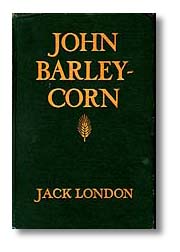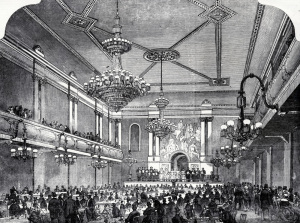Reading, Writing and Identity, James Ashley (b.1833)
Within James Ashley’s memoir he doesn’t specify particular pieces of literature in which he read. However there are implications to suggest novels he may have read that had an influence on his life. Furthermore what James mentions he did in his leisure time, may suggest other genres of literature he read. Within the start of James’s memoir, after he had finished his apprenticeship in the year 1854, James deliberates on the hardship of finding work. ‘The prospect of earning my living by my trade was gloomy and I tried all I knew to find something away from the trade, but without success.’(Ashley pg.4) As I have stated in earlier blog posts, James eventually managed to create a sense of financial security, due to the possibility of him being able to identify his social class and break stereotypes placed above him. One of these stereotypes was the juxtaposition between working class men and alcohol consumption.
One of the reasons I believe to be behind James’s success was the fact that he didn’t drink and saw it more of a ‘curse’ rather than a means of pleasure. “Daily afterwards I saw the curse the drinking customs were to the men around me; if I had followed their course there would have been no possibility of uplifting.” (Ashley pg.7) James states that he had been an abstainer for five years within his memoir, so the reason behind his decision to separate himself from alcohol cannot be accurately acknowledged. However in the year 1856 he undertook a position in a play called ‘The Trial of John Barleycorn’. “Just at this time we were rehearsing for “The Trial of John Barleycorn” which was to be given on the evenings of Easter Monday and Tuesday in the Music Hall.” (Ashley pg.5) John Barleycorn was originally a British Folk-song, in which the character John Barleycorn personifies alcohol. However in the early 20th century, the name John Barleycorn was used to title an autobiographical novel written by Jack London, published in 1913.The novel deals with his enjoyment of drinking and struggles with alcoholism.

The location of the play detailing the struggles of a man with alcoholism issues I find is extraordinary, as music halls within the 19th century were usually associated with alcohol and the working class.
“Music Halls became popular during the mid-nineteenth century and grew up in the industrial towns, and in London itself. They began as ‘singing saloons’ in pubs, and the popularity of such entertainment ensured an expansion which was to lead to the opening of the first music halls.” (Williams pg.452)

Through James’s participation within this play, it leads me to believe he may have read wider aspects of literature which detail struggles of alcoholism. The relationship between this play and James may be evident to suggest that this particular piece of literature acted out as motivation behind James’s decision to become an abstainer. Reading through The Trial of John Barleycorn this idea begins to depict itself clearer. Within the first two pages of the trial, a list is conducted of all the charges faced by John Barleycorn, with each one of them being centered on the indictment of alcohol. The charges are structured in a list format, and proceed from one too twelve. Reading through these charges, it would be clear to see how they would have an impact on someone’s decision to abstain from drinking, especially James. As they detail the destruction of important aspects of life in which James holds most dearly, such as family and the ability to uphold a profound work ethic. Charges six and seven are perfect examples of this.
“Sixthly- That he has destroyed the peace of many families- broken up the domestic circle- separated husband and wife- causing quarrels between the nearest relatives and friends, many of which proved fatal.” (Beardsall pg.4)
“Seventhly- That he has influenced certain workmen to neglect their employment, to the great inconvenience and loss of their employers, and to spend their money and their time at the public house, to the great injury of their families, which have become a burden to the community.” (Beardsall pg.4)
It is through the participation within the play of the ‘The Trial of John Barleycorn’, which may have possibly lead to further readings of perhaps autobiographical literature of people from similar social class backgrounds, detailing the consequences of alcohol. This Constituted towards his decision to abstain from drinking and In turn help define and create a sense of respectability within his identity.
Other literature in which James may have read throughout his lifetime is apparent within his memoir through the participation of Christian preaching’s given out by Charles Spurgeon. Charles Spurgeon born 1834 was a widely renowned Baptist preacher in the 19th century and remains to this day highly influential among Christians of various faiths. As well as his ability to endorse people by his preaching’s, Spurgeon was also a prolific author, conducting many types of work including commentaries, books on prayer, poetry and sermons.

James first visited a Spurgeon preaching on his first Sunday, after his move to London to undertake employment. “On my first Sunday, 10th May, 1856 I went to hear the famous preacher and was enquiring the way of two gentlemen when they said they were going also.” (Ashley pg.9) Through James’s participation of these preaching’s it is evident that he read a lot of Christian literature wrote by Spurgeon. As James also attended a national school when he was a child, which abided by a curriculum in which religious education was compulsory, he may have already been familiar with Christian literature. However I believe this type of literature did not start to have an active effect upon James until he started attending Spurgeon’s preaching services.
“Those who observed his life up close commented on his perpetual private communication with God, and it was the intimate spiritual richness of these times alone with the Lord that overflowed into Spurgeon’s public prayers and led people to feel as if he were taking them into the very portals of heaven through his petitions.” (Miller pg.15)
James’s life started to slowly come together after he moved to London and he continually visited the services held by Charles Spurgeon. During times where he could not attend due to work or other factors, he would divulge into sermons, which were pieces of literature transcribed as Spurgeon spoke. The continuity of this religious practice I believe helped James shape and define his identity throughout his life, as it may have helped him feel more connected to god. His part time work at a ragged school constituting towards helping others less fortunate was prolific in abiding by god’s word. Also his practice of the sabbatical represents his continuous faith, and exemplifies how Christian teachings and literature helped pave the way for a life conducted by religious regulations.
Bibliography
Steve Miller, C.H. Spurgeon on Spiritual Leadership. United States of America. Moody Publishers. 2003
Beardsall Francis, Trial of John Barleycorn, alias Strong Drink … Stereotyped edition. London. Abel Heywood. 2013
Williams Chris, A companion to 19th-Century Britain. Oxford. Blackwell Publishing Ltd. 2004
Ashley James, Untitled, pg1-50,(c, 12,500 words). Brunel University Library. Vol:1 No:24

Leave a Reply